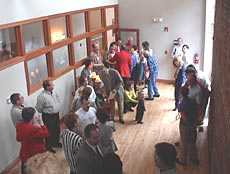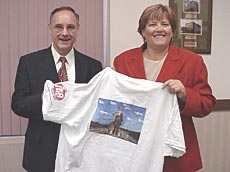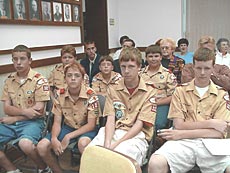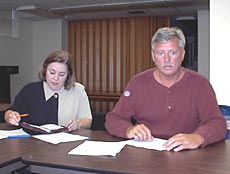|
Memorial
Day ceremony
scheduled for Lincoln
‘Remember,
freedom is not free’
[MAY
26, 2001] The
Rev. James Cravens of Trinity Episcopal Church in Lincoln will be
the guest speaker at the Memorial Day services at 10:30 a.m. Monday,
May 28, on the courthouse lawn in Lincoln.
|
|
Cravens
has been a military man for many years. He serves as deputy fleet
chaplain, director of reserve religious ministries, U.S. Atlantic
Fleet, Norfolk, Va.
Tom
Gerdts of Lincoln Christian Church will give the invocation and
benediction at the ceremony.
Tom
Murray is in charge of the firing squad, and Haydn Gerdts will play
"Taps." C. Wayne Schrader is the master of ceremonies. The
auxiliaries will participate in the laying of the wreath.

[to top of second column in
this article]
|

The
local veterans sponsor the Memorial Day services. Ham and beans will
be served at the American Legion Post 263 hall in Lincoln after the
ceremony.
All
the people of Lincoln and the surrounding area are encouraged to
take time to honor and remember those young men and women who gave
their lives so we can remain a free nation. Remember, freedom is not
free.
[News
release]
|
|
|
Memorial
Day, a day to honor all
military personnel who died in service
[MAY
26, 2001] There
are two theories about the origin of Memorial Day, formerly called
Decoration Day. The first people to celebrate it may have been the
Southern women who spread flowers on the graves of veterans. Or the
founder may have been Union Gen. John A. Logan, who decided after
the Civil War that the United States needed to honor the war dead
and followed through with a speech at Arlington National Cemetery in
1868. Gen. Logan was the son of Dr. John Logan, the Illinois General
Assembly colleague of Abraham Lincoln after whom Logan County was
named.
|
|
In
1971 Decoration Day officially became Memorial Day, and Congress
declared the last Monday of May as the day to honor all military
personnel who died in service to this country. Many families use the
day to decorate all their graves, but officially it is devoted to
those who died while in military service.

[C. Wayne
Schrader is a student of the history of Memorial Day.]
According
to C. Wayne Schrader, finance officer and past commander of American
Legion Logan Post 263, the number of volleys, the playing of
"Taps" and the timing of the ceremony are grounded in
history. He said that firing squads used to be restricted to seven
members, so a 21-gun salute was seven riflemen firing three volleys
each. At Monday’s service the squad will probably be somewhat
larger but will fire the traditional three volleys.
"Taps"
was composed by Union Gen. Daniel Butterfield in 1862. His men had
begun to falter, and he himself was seriously wounded. When he
learned from President Lincoln that there would be no
reinforcements, Butterfield sought a way to bring comfort and peace
to his tired men. He hummed the sounds he wanted, and his bugler,
Oliver W. Norton, wrote the seven notes on the back of an old
envelope. When Norton first played the song on July 2, 1862, the
effect was magical, and soon it was being heard throughout the Army
of the Potomac. A few days later it was used for the first time at
the funeral of a fallen soldier. In 1874 the U.S. Army officially
adopted "Taps."

When
the armistice ending World War I was signed, Gen John J. Pershing
asked Hartley B. Edwards, an American soldier, to play a final
"Taps." The hour was 11 a.m. Organizers of the Lincoln
Memorial Day service try to time the program so "Taps" is
played at that same hour.
[to top of second column in
this article]
|

In
anticipation of the Memorial Day service, the American Legion will
distribute poppies Friday and Saturday, May 25 and 26. Schrader said
that all poppies are made by hospitalized veterans, who receive
three cents for each poppy they make. All other money collected in
Lincoln will be sent to rehabilitation units in veterans hospitals.
Schrader is one of four judges of the local poppy poster contest for
school-age children. The winning poster in the oldest class is sent
to the national competition, where the first-place prize is a
scholarship.
A
few days before Memorial Day Greg Fitzpatrick leads a crew who place
flags on the graves of all former American Legion members buried
near Lincoln. About 900 flags are placed.

Schrader
himself has spoken at Memorial Day programs and often uses the poem
"Freedom Is Not Free," written by Cadet Maj. Kelly Strong,
a Homestead, Fla., high school student and member of Air Force
Junior ROTC. Schrader quotes the title to emphasize the cost in
human life of the democratic institutions citizens sometimes take
for granted. Memorial Day is the time set aside to remember the
sacrifice of so many lives in war.
Veterans
Day, celebrated Nov. 11, differs from Memorial Day in that it honors
all veterans, living and dead, whereas Memorial Day honors only the
dead.
Schrader
hopes for a good attendance at this year’s service. He also wishes
that every veteran would join a veterans organization. He points out
that all were founded to help veterans and that the organizations
have spent hundreds of thousands of dollars on hospitals and
assistance to families.
[Lynn
Spellman]
|
|
|
Senate
Week in Review
Illinois
Senate agrees on new districts
[MAY
26, 2001] A
historic agreement on a congressional map and the establishment of
task forces to study Illinois election procedures and the expansion
of the state’s KidCare program highlight Senate action this week,
according to Sen. Bob Madigan, R-Lincoln.
|
|
The
new map, which eliminates one district as dictated by the 2000
census figures, marks an agreement by congressional map negotiators.
This historic bipartisan agreement means the state will not have to
argue in the courts, as in previous decades. The proposed maps (HB
2917) are now pending approval in the House of Representatives.
Senate
Resolution 153, adopted by the Senate Executive Committee, creates
the Senate Task Force on Integrity in Voting. The task force will
examine the state’s voting process and election technology in the
light of last year’s events in the Florida election.
Senate
Resolution 152 proposes an examination of the state’s KidCare
program before the program is expanded to include families.
The
Senate also approved two economic development measures, which will
now return to the House of Representatives for further approval:
McCormick
Place (HB 263) —
Allows expansion of the state’s premier convention and exposition
center and creates a fund for statewide economic development
purposes.
Boeing
(HB 1655) —
Authorizes a $64.1 million ($41.1 million state assistance, $23
million Chicago assistance) in economic incentives to the Boeing
Corporation as they prepare to move their headquarters to Chicago, a
move which is projected to bring 500 jobs and $4.3 billion in
revenues to Illinois over the next 20 years.
The
following measures were approved by both chambers and currently
await consideration by the governor:
CHILDREN/FAMILIES
Abandoned
babies (SB 216/HB 632) —
Allows parents of newborn infants to leave their baby at a safe
haven (church, hospital, fire station, etc.) for purposes of
adoption without any civil or criminal repercussions.
Child
support (SB 950) —
Publishes a list naming 200 child-support deadbeats who owe $5,000
or more in back support. (SB 993) — Notifies parents who
are 30 days late (or more) on child-support payments that simple
interest will accrue at the rate of 9 percent.
Unattended
children (SB 28) —
Sets penalties for adults who leave young children unattended in a
motor vehicle.
Tobacco
(HB 2254) —
Creates a unique driver’s license format for those younger than
age 19 to prevent underage purchase of tobacco.
Alcohol
delivery (HB 1000) —
Requires delivery people to get the signature of someone at least 21
years old when delivering alcohol.
CONSUMERS
Sweepstakes
fraud (SB 797) —
Protects consumers from sweepstakes fraud by requiring mailings to
state clearly that no purchase is necessary, disclose all
information and award the prize within 30 days.
Restricted
call registry (HB 176) —
Creates the statewide Restricted Call Registry for consumers who do
not want to be called by telemarketing sales companies.
Halal
food (SB 750) —
Makes it a Class B misdemeanor to misrepresent food as being halal,
food that is prepared under the strict compliance with laws and
customs of the Islamic religion.
CRIME
Pupillometers
(SB 1517) —
Creates a pilot program using Pupillometers for drug tests of prison
inmates with drug and alcohol abuse problems.
FOID
cards (SB 1065) —
Provides more oversight for the FOID card application process,
tightens the FOID card felony exemption, creates a new offense for
anyone falsifying a FOID card application, uses driver’s license
photos to confirm identities and cracks down on repeat FOID card
offenders. (HB 1942) — Sets Class 2 felony penalties for
any person who forges or materially alters or counterfeits a FOID
card or possesses a card that has been forged, altered or
counterfeited.
Project
Exile (HB 231) —
Encourages the federal prosecution of anyone who illegally uses
firearms in crimes against others.
Seized
property (SB 1098) —
Requires law enforcement agencies to return vehicles or vehicle
parts that were seized for evidence in the same condition they were
at the time they were seized, unless criminal charges are pending or
stolen parts have been removed.
Videotaped
testimony (SB 401)
— Allows videotaped testimony of a mentally disabled victim
who is not institutionalized to be admitted into evidence in the
same manner that testimony of an institutionalized victim or the
testimony of a child victim can be admitted into evidence.
DUI
fines (SB 64) —
Increases the fine DUI offenders pay to trauma centers from $25 to
$100 for a first offense and $200 for a subsequent offense. Creates
an additional $5 fine to benefit research on spinal cord injury
paralysis.
Gang
crime (HB 1812) —
Strengthens penalties for street gang members who violate laws
against murder, assault and battery.
Aggravated
DUI (SB 2290) — Allows
for extended term sentencing on all aggravated DUI convictions
rather than just those resulting in great bodily harm or permanent
disability.
Crime
victims (HB 2865) —
Adds stalking and aggravated stalking to the list of crimes for
which victims can be compensated through the Crime Victims
Compensation Act. (HB 863) — Allows the court to accept a
victim impact statement from family members of the victim.
Aggravated
Arson (HB 2295) — Expands
aggravated arson to include damage to a house trailer, watercraft,
motor vehicle or railroad car.
Multiple
felonies (HB 2300) — Allows
out-of-state convictions to count in determining sentencing.

[to top of second column in
this article]
|

EDUCATION
School
budgets (SB 898) —
Requires school districts with websites to post their current annual
budget, itemized by receipts and expenditures.
Education
license plates (SB 1521) — Creates
education license plates with funds benefiting scholarships for
teachers. Illinois school children will design the special plates in
a statewide contest.
College
savings (SB 902) — Creates
a state income tax deduction for contributions to Bright Start, the
treasurer’s college savings plan on which earnings are already tax
deferred.
Abuse
(HB 3055) — Includes
in a child’s permanent school record information about
investigations of suspected abuse and neglect.
MAP
grants (SB 406) —
Increases the maximum Monetary Award Program grants for
undergraduate students.
Alcohol
and school (HB 445) —
Prohibits the consumption of alcohol on public school property.
Safe
to Learn (HB 678) —
Extends the Safe to Learn Program in Illinois schools to July 1,
2005, a three-year extension.
Teachers
(HB 1048) —
Requires Internet posting of unfilled teaching positions in
Illinois.
Tax
equivalent grants (SB 326) —
Allows school districts (except Chicago) to receive tax-equivalent
grants if a United States military installation or base is located
in its boundaries and children from the base attend schools in the
district.
GOVERNMENT
Emergency
notice (HB 1694) —
Allows public safety agencies to utilize unlisted numbers in
emergency situations, such as snow emergencies, for reverse 911
calls.
Miami
lawsuit (HB 1623) —
Extends the legal defense fund to assist landowners in the Miami
Nation lawsuit through FY 2002.
Energy
efficiency (SB 606) —
Offers low-interest loans for energy efficiency improvements in
governmental, commercial and certain multi-family buildings.
Small
business (SB 1522) —
Make plain-language descriptions of laws or administrative rules
affecting small businesses available on the Internet.
HEALTH
Vaccinations
(SB 1305) — Does
not allow officials to decide that a child is neglected or abused
for the sole reason that the child’s parents or guardians did not
vaccinate the child.
Insurance
discrimination (SB 869) —
Prohibits unfair discrimination based upon race, color, religion or
national origin by life, accident and health insurance policies.
Genetic
testing (SB 42) —
Prohibits insurance companies from using genetic testing information
in connection with accident and health insurance policies.
Infectious
diseases (SB 382) —
Notifies firefighters and emergency medical technicians, as well as
other medical professionals, when they have treated a patient with a
communicable or infectious disease.
Insurance
(SB 935) —
Requires insurance companies to notify their health insurance
customers of changes in lists containing information about the
prices of approved medications.
DNR
(HB 2276) —
Requires a uniform do-not-resuscitate order form for use by
physicians.
Nursing
scholarships (HB 2436) —
Increases the number of scholarships available for nurses who plan
to practice in Illinois.
Fetus
burial (HB 382) —
Allows parents to bury or cremate a child miscarried after less than
20 weeks of gestation.
TRANSPORTATION
Car
keys (SB 115) —
Car dealers may not issue replacement keys for a vehicle without
making a copy of the person’s driver’s license and keeping it on
file.
Disabled
parking (HB 846) —
Limits who can receive disabled parking permits and makes it illegal
to park in access areas to disabled parking spaces.
The
Senate also acted on a number of resolutions including:
After-school
programs (SR 70) — Asks
the State Board of Education and Illinois Department of Human
Services to convene and co-chair a task force to promote quality
after-school programs for school-age children.
Casinos
(SR 88) — Objects
to the construction of large casinos along the Illinois border,
specifically in Wisconsin, and urges the Bureau of Indian Affairs to
halt construction of such casinos until the citizens of Illinois
have a chance to voice their concerns.
Flag
Month (HJR 6) —
Declares June 14 through July 14 as American Flag Month.
Purple
Heart stamps (HJR 13) —
Urges the Postal Service to issue a Purple Heart stamp, honoring
those veterans who received the Purple Heart Medal of Merit.
Pearl
Harbor (SJR 6) —
Urges all state agencies, schools, organizations, groups and
individuals to fly the United States’ flag at half-mast on Dec. 7
in honor of the men and women who died at Pearl Harbor.
Retired
teachers (SJR 32) --
Addresses concerns by retired teachers throughout Illinois that a
proposed 70 percent increase in health insurance premiums is too
high, asking for an increase similar to previous years
(approximately 6 percent) and establishing a task force to
investigate the problems.
[News
release]
|
|

|
|
|
Show
your appreciation to those who
have risked their lives for your freedom
[MAY
25, 2001] American
Legion veterans will be distributing poppies this weekend. If you
see these guys, go out of your way to get a poppy. They are handmade
by veterans in VA hospitals. All of your donation goes directly to
the disabled veterans who made them and to the hospitals.
|
|
Our
staff offers more than 25 years of experience in the
automotive industry.
Greyhound
Lube At
the corner of Woodlawn and Business 55 No
Appointments Necessary |
The
Mustard Moon
1314
Fifth Street
Gifts ~
Dolls
Infant Clothes
Mention
ad
for 2 FREE votives |
Tell
a friend about
Lincoln Daily
News.com |
|
|
|
Attorney
Wright in the running
for statehouse seat
[MAY
25, 2001] Lincoln’s
city attorney, Jonathan Wright, has announced that he is a candidate
for the seat in the Illinois House of Representatives being vacated
by Rep. John Turner of Atlanta. Wright’s candidacy brings the
number of those vying for the seat to at least seven, three of them
from Lincoln.
|
|
The
other Lincoln area candidates are Carla Bender, clerk of the Logan
County Circuit Court and former campaign manager for Turner, and
Eric Spanton, an Illinois State Police officer. Also on the list are
Joe Alexander of Clinton, former aide to recently retired U.S. Rep.
Tom Ewing of Pontiac; Jerry Davis, former mayor of the town of
Leroy; Jered Hooker, DeWitt County Republican chairman; and Tim
Siekmeyer of Mason County.
The
90th District statehouse seat will become vacant June 1, when Turner
takes a seat on the Illinois Appellate Court for the 4th Judicial
District.
The
seat will be filled by a candidate chosen by the Republican county
chairmen
in the
counties of the 90th District. The district includes all of Logan,
Mason and DeWitt counties, small parts of Tazewell and McLean
counties, and a very small part of Piatt County. The appointment
must be made by July 1.

Wright,
who grew up in Carol Stream (a western suburb of Chicago), graduated
from Monmouth College, Monmouth, and received his law degree from
Chicago-Kent College of Law. He practiced law in Monmouth and then
worked for the attorney general’s office in Springfield.
In
1995 he began practicing law in Lincoln, then joined a Pekin law
firm, but returned to full-time practice in Lincoln in 1997. He has
lived in Logan County since 1994.
In
April of 1998 he became city attorney for Lincoln, and he also does
work as an attorney for the city of Atlanta and the village of
Middletown.
He
says it is a loss for the 90th District that Turner is stepping down
from the house seat, but Turner’s appointment is a gain for the
Appellate Court. He also believes the district is "at an
advantage having so many qualified candidates turn out to fill the
vacancy."
Wright
says that while he doesn’t believe a person must have a law degree
to be a good public official, it is an added benefit.
"There
are a number of duties you take on as a state legislator, not the
least of which is reading, interpreting and analyzing legislation.
Not only my educational background, but my experience in court and
legal work can help when legislative issues come to a vote.
"In
addition, the training and experience I have had as an attorney will
greatly assist me in terms of my ability to think on my feet and to
communicate, not only one-on-one but also to a group."
He
also thinks his legal training will help him to make difficult
decisions. "It’s one thing to make a decision knowing
everyone is going to support you. It’s another thing to make a
decision under pressure, knowing that no matter what you decide,
someone is not going to agree. Whether in municipal or private
practice, I have to be in a position to make such decisions and be
able to support them and argue persuasively for them. As a state
legislator, it will be important at some time for me to be able to
do that."
Wright
believes the experience of starting and operating his own business
successfully is another asset. "Most people don’t think of a
law office as a business, but it is that," he explains.
An
active member of the Park Meadows Baptist Church in Lincoln, where
he coaches the church’s basketball team, Wright defines himself as
a Christian and a family man. "I define myself by my faith in
God and my Christian beliefs," he says. "That is a
valuable insight on who I am and what my values are.
"The
other way I would define myself is by introducing my wife and
children," he adds. Wright is married to the former Melanie
Usherwood and has three daughters, Kate, age 5, Alison, 3, and
Melissa, 1. "My family life is important, I actively schedule
time with my wife and children."
White
says if he is appointed, he will seek re-election when Turner’s
term expires in January of 2003, even though redistricting may
change the borders of the district he would have to run in.
[to top of second column in
this article]
|

"When
I considered seeking the appointment to fill Representative Turner’s
term, I tried to play out in my mind the likely scenarios, even
including that this district would no longer exist and I would have
to be running against an incumbent.
"If I were given the
honor of being a state representative, it would be incumbent on me
to run for re-election," he says.
[Joan
Crabb]

|
|

|
|
|
Council
OKs animal-control
contract with county
[MAY
24, 2001] Its
questions about fees answered, the Lincoln City Council approved a
three-year contract with Logan County for animal-control services.
|
|
Under
the contract, the city will pay a fee of $27,950 per year for the
next three years. After former Alderman Steve Mesner said the city
and other municipalities paid fees but the county did not contribute
a fair share, council members questioned whether the city was paying
more than it should.
"The
question we wanted answered is whether the city is getting its fair
share, what we pay for," Alderman Steve Fuhrer said. Several
Logan County Board members who were in the audience provided the
answer.

Dick
Logan, board chairman, said the animal-control facility
"operates at a loss, and we pay the extra out of the general
fund."
Rod
White, finance chairman of the board, said the budget for the
animal-control facility is $77,500, but last year the county had to
add $12,000 from the general fund to meet expenses. Some years the
county has added as much as $20,000, White said.
The
city of Lincoln contributes $27,950 to the animal-control budget,
smaller communities in the county contribute another $21,067, and
the county picks up the rest, officials said.
"I
feel the contract is fair," said Alderman Verl Prather,
chairman of the sanitation committee. "We couldn’t hire
someone to do this for $27,000."

Reimbursement for road damages
The
council also agreed to reimburse West Lincoln Township $16,000 for
damages incurred when a water main break on Route 10 last February
made it necessary to reroute traffic along Connolley Road to Fifth
Street. The $16,000 is the cost of returning the street to the
condition it was before the traffic was rerouted. However, the city
will also see whether reimbursement is available from the city’s
insurance company, since the Illinois Department of Transportation
directed the city to reroute the traffic when the water main broke,
and the city had no choice in the matter.
[to top of second column in
this article]
|

Policemen promoted; awards given
Police
Chief Richard Montcalm announced two promotions within the
department, Paul Adams to corporal and David Sielaff to sergeant.
Adams, who has been with the police department for four years, was
injured in the line of duty and is presently home recuperating,
Montcalm said.
Montcalm
also presented awards for participation in violence-prevention
programs to representatives of three area schools: Carroll Catholic,
Chester-East Lincoln and West Lincoln-Broadwell.
He
also presented an award to Sgt. Darrell Sisk, retiring after 30
years, and announced that James Raymond has completed his probation
and is now a regular officer. Two new officers will be added to the
department as of May 31, Christi Jackson and Jason Lucas.
Upgrade plans for wastewater plant
approved
The
council also approved the final design and the overall project
approach for the wastewater treatment plant upgrade, along with
approval of additional engineering charges. The $10 million upgrade
is necessary to remain in compliance with Illinois Environmental
Protection Agency requirements.
Low interest rates on investments
City Treasurer Les Plotner
reported that the city at present is receiving "very poor
interest rates" on its investments, ranging from 4.31 percent
to as low as 3.51 percent.
[Joan
Crabb]

|
|
|
New
business brings life to downtown and cutting-edge technology to
Lincoln
[MAY
22, 2001] Integrity
Data, a technology consulting and computer programming organization,
has recently completed renovations of its new office at 110 N.
Kickapoo St. in downtown Lincoln. Integrity Data purchased the
former Schick buildings at 604 Broadway and 110 N. Kickapoo St. The
firm’s new office space is on the second floor of the Kickapoo
Street side of the building, which is now referred to as the
Integrity Building. Midwest Bible School will occupy the first floor
of the building.
|
|
Integrity
Data designs and develops custom computer software solutions to
improve business management processes. A majority of Integrity Data’s
clients are organizations that use software developed by Great
Plains Business Solutions, which was recently acquired by Microsoft.
Integrity Data’s clients are located in all regions of the United
States. Integrity Data develops its products using the latest
software development tools and data management systems from
Microsoft and Great Plains. In addition to its core business,
Integrity Data also offers communication and computer network cable
installation services.

Integrity
Data, Inc. is owned and operated by Patrick Doolin, a Lincoln
native, and Mark Hisken of Willmar, Minn. Hisken manages the
Integrity Data office in Minnesota.
The downtown Lincoln location is
an attractive investment due to the opportunity to enhance an
otherwise vacant building, as well as bring a new type of business
to the local economy and, in doing so, demonstrate that Lincoln is a
business-oriented community.
[to top of second column in
this article]
|
The
building located at 604 Broadway, which faces the courthouse,
encompasses nearly 6,000 square feet and became available for lease
on May 1.
A
ribbon-cutting ceremony and public open house was from 5 to 7 p.m.
Monday, May 21, at the main entrance, located at 110 N. Kickapoo St.
[News
release]

|
|
|
Lincoln
statue proposal brings
crowd to council meeting
[MAY
22, 2001] The
Lincoln City Council chamber had a full house Monday evening for a
presentation by the Rev. S.M. Davis. Davis presented a proposal to
erect a giant statue of Abraham Lincoln depicting him christening
the town of Lincoln with watermelon juice.
|
|
The
305-foot statue (the height of the Statue of Liberty, including its
base) would be a city landmark and tourist attraction, Davis said.
It would be visible as far as 50 miles away on Interstate 55 and
could be the focus of a theme park or playground, with an
observation deck, a visitors center pointing out Lincoln sites in
the area, an I-Max theater, and perhaps other attractions.
"If
this were to happen, it would forever change the city of Lincoln and
Logan County," he told the audience. It could bring in from
5,000 to 15,000 tourists per day, promote the building of motels and
restaurants, bring a rise in property values, and perhaps double the
size of the city.
Davis
believes corporate sponsorship is the best way to fund the project,
and he noted that a two-man committee of Larry Steffens and Daris
Knauer has been appointed to look into such funding.

[The Rev. S. M. Davis of the Park Meadows Baptist Church, originator
of the idea of the giant statue of Abraham Lincoln as a city
landmark, and Lincoln Mayor Beth Davis display a T-shirt with a
picture of the proposed statue.]
Asked
by Alderman Steve Fuhrer if any corporations have come forward to
show interest in financing the project, Davis said none have at
present, but a "millionaire from Springfield" had
contacted him about building a smaller version of the statue in the
state capital, a proposal which he turned down.
The
statue should be in Lincoln because "that is our claim to
fame," he said. People all over the world know Lincoln, but
very few know that he christened the town of Lincoln with watermelon
juice.
He
suggested the statue might have a "watermelon juice
waterfall" 200 feet high and stairs and elevators to take
visitors to an observation deck inside Lincoln’s hat. In the
sketch of the proposal, Lincoln is standing by a barrel, which would
house the theater and information center. The statue is based on a
sketch by Lloyd Ostendorf, whose paintings of events in Lincoln’s
life are on display in the State Bank of Lincoln on Sangamon Street.
Davis
suggested that the information center emphasize the character of
Lincoln, with exhibits which explained his determination, wisdom,
justice, honesty, sensitivity and boldness.
As a
step toward building the statue, he asked for a "straw
vote" from the council indicating their approval, as "It
is not going to go forward if leaders of our community are not in
favor of it."
After
being assured that the straw vote did not mean a financial
commitment by the city, Alderman Michael Montcalm voted
"yes," followed by "yes" votes from eight of the
nine other council members present. Alderman Patrick Madigan voted
"no." He later told the Lincoln Daily News that he
thought the project was "out of character" for Lincoln.
"Something else could be more tasteful and less grandiose. Of
course, I could be wrong."
The
Rev. Davis has been a pastor in Lincoln for 26 years and said he
"loved being in Lincoln. I have been praying for some way to
serve the leaders of the city and the county."
[to top of second column in
this section]
|

He has
been promoting "what I called for a long time my ‘crazy idea’"
to groups in the area, including the tourism board and Main Street
Lincoln. Representatives of both groups attended the meeting, along
with several members of the Logan County Board.
At the end of the
presentation, Davis passed out T-shirts, provided by Lincoln IGA,
with a picture of the proposed statue.
[Joan
Crabb]

[Lincoln Scout Troop 102 attended the council meeting
May 21 as part of their work toward a merit badge in communications.
Right to left, front row, are Aaron Uphoff, Joe Gillen, Aaron
Meyrick and Sean Weaver. Left to right, back row, are Cory Bell,
Marty Oltmanns, Andy (Jesse) Cummings and assistant troop leader
David Weaver.]
|
|
|
At
first meeting, Logan County Arts Association refines constitution
[MAY
22, 2001] Seven
people attended the first meeting of the Logan County Arts
Association, formed to promote the arts and make them an integral
part of life in Logan County. Marshall Jacobs chaired the meeting
Monday night at Lincoln Public Library.
|
|
The
group considered issues raised by a constitution and other documents
composed by Jacobs during the last two months. After input has been
incorporated, the final copy of the constitution will be drawn up by
an attorney, and the group will apply for tax-exempt status as a
charitable organization. Jacobs said he has already written Sen. Bob
Madigan and Rep. John Turner asking for start-up funds from Illinois
First.

[Louella Moreland and Dan Bailey, both active in
Lincoln Community Theatre, made suggestions for revising the
constitution of the Logan County Arts Association.]
As
modified by the group, the constitution defines a three-tiered plan
of organization, consisting of the general membership, the board of
directors and the executive committee, which will include the
officers and one other board member.
One
working paper identified eight classes of members, based on monetary
contribution and named with various terms from the arts such as
cast, orchestra and choreographer. The group spent some time
suggesting names that would represent all the artistic disciplines:
visual, dance, music, theater and literature.
Monetary
levels of membership range from $25 to $5,000. Jacobs said the range
should be broad to include corporate giving, matching funds programs
and estate planning potential.
Jacobs
first became interested in forming the association when he
discovered that committees putting on local festivals did not always
know about available sources of funding and that Logan County did
not have an arts association to inform them. He sees the association
as a complement to other organizations already in existence, such as
the Lincoln Logan County Chamber of Commerce and Looking for
Lincoln.
A
preliminary meeting to gauge interest in an arts association was
held a month ago, with Sen. Madigan and Rep. Turner present. Out of
that meeting came a founding board of five directors, three of whom
were present Monday: Jacobs, Richard Sumrall and Chris Gray. They
signed a document establishing the Logan County Arts Association as
an organization in the state of Illinois. The other founding
directors are Jean Gossett and Larry Steffens.
[to top of second column in
this article]
|

[Chris Gray, Richard Sumrall and Marshall Jacobs
are among the founding directors of the Logan County Arts
Association. Jacobs chairs the group.]
Of
the two major roles played by arts councils, hands-on or
facilitative, Jacobs is primarily interested in the latter, seeing
the arts association as a clearinghouse of information for other
organizations. However, the issue has not yet been decided by the
association, and at some time it may offer classes or conduct other
hands-on activities.
Programs
supported by other arts associations include bringing in artists
from outside the area as well as encouraging and supporting local
artists. In addition, Jacobs said, the Illinois Arts Council has an
initiative for increasing arts in the school system.
One
of several statements of the group’s mission includes the
possibility of involvement beyond Logan County, saying that the
association is formed "exclusively for the educational purpose
of encouraging and promoting the study and cultivation of the arts
in Logan County and adjoining counties." Jacobs said people
from Clinton have expressed interest in working with the new
association. Logan and DeWitt counties are complementary in the
arts, he said, because Lincoln has a greater emphasis on performing
arts and Clinton on visual arts.
Another
possibility mentioned by Jacobs is working with the Chamber to
acquire the Lincoln theater building and adapt it to provide areas
for dramatic performances and for display of visual arts. The
building, classified as a "contributing historical
structure," was dedicated on Lincoln’s birthday in 1923.
Jacobs,
who has worked five years for the Springfield Zoological Society,
holds an MBA in finance and has experience in grant-writing. Last
weekend he attended a seminar sponsored by the Illinois Arts Council
and the Illinois Arts Association. He chose sessions on
technological implementation and talked with consultants from
Chicago about creating and using databases for arts associations.
The
Logan County Arts Association meets on the third Monday of the month
at Lincoln Public Library at 6:30 p.m. Anyone interested in
promoting the arts in Logan County is encouraged to attend.
[Lynn
Spellman]
|
|
Back
to top
|
News
| Sports
| Business
| Rural
Review | Teaching
& Learning | Home
and Family | Obituaries
Community | Perspectives | Law
& Courts | Leisure Time | Spiritual
Life | Health
& Fitness | Letters
to the Editor
|
|